Organisational Analysis Assignment 1 - Module: Leadership
VerifiedAdded on 2023/01/18
|7
|2386
|65
Homework Assignment
AI Summary
This document provides an analysis of an Organisational Analysis assignment, which examines four research papers. The first paper, by Tata and Prasad (2015), explores the relationship between national cultural values, sustainability beliefs, and organizational initiatives. The second paper, by Powel and Osborne (2015), investigates how marketing can contribute to sustainable social enterprises. The third paper, by Cho et al. (2019), discusses organized hypocrisy, organizational facades, and sustainability reporting. The fourth paper, by Atkins, Thomson and Maroun (2015), explores the concept of utopian sustainable accounting. Each paper's arguments, methods, and alignment with organizational analysis rationales are critically analyzed. The assignment highlights the importance of understanding cultural values, sustainability, marketing strategies, and reporting practices within organizations. The analysis utilizes secondary data collection methods, case studies, and qualitative approaches to evaluate the papers and match the findings to the rationales presented in organizational analysis lectures, considering paradigms like functionalism and social relativism.

Organisational Analysis Assignment 1
Student Name:
Student ID:
Student Name:
Student ID:
Paraphrase This Document
Need a fresh take? Get an instant paraphrase of this document with our AI Paraphraser
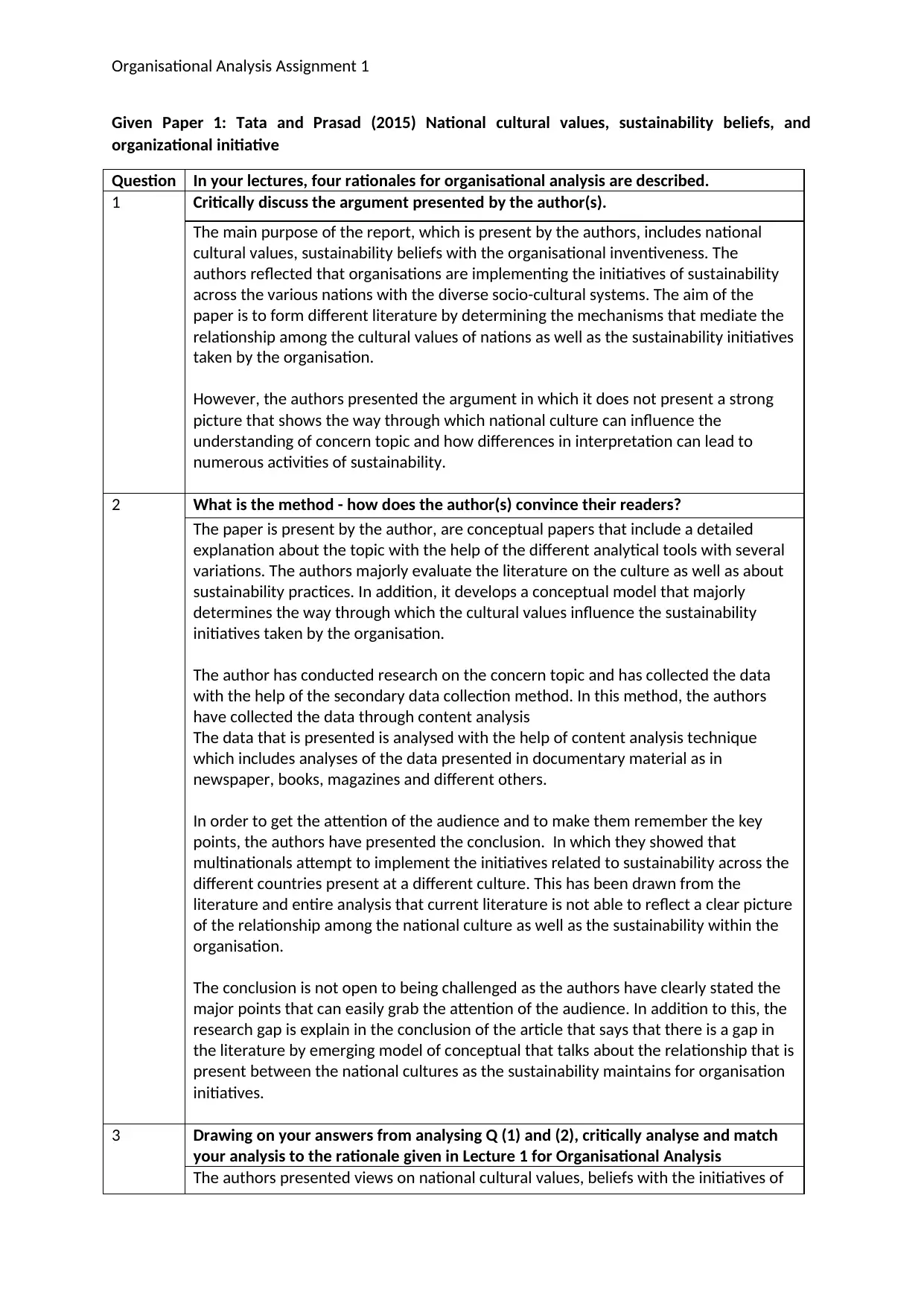
Organisational Analysis Assignment 1
Given Paper 1: Tata and Prasad (2015) National cultural values, sustainability beliefs, and
organizational initiative
Question In your lectures, four rationales for organisational analysis are described.
1 Critically discuss the argument presented by the author(s).
The main purpose of the report, which is present by the authors, includes national
cultural values, sustainability beliefs with the organisational inventiveness. The
authors reflected that organisations are implementing the initiatives of sustainability
across the various nations with the diverse socio-cultural systems. The aim of the
paper is to form different literature by determining the mechanisms that mediate the
relationship among the cultural values of nations as well as the sustainability initiatives
taken by the organisation.
However, the authors presented the argument in which it does not present a strong
picture that shows the way through which national culture can influence the
understanding of concern topic and how differences in interpretation can lead to
numerous activities of sustainability.
2 What is the method - how does the author(s) convince their readers?
The paper is present by the author, are conceptual papers that include a detailed
explanation about the topic with the help of the different analytical tools with several
variations. The authors majorly evaluate the literature on the culture as well as about
sustainability practices. In addition, it develops a conceptual model that majorly
determines the way through which the cultural values influence the sustainability
initiatives taken by the organisation.
The author has conducted research on the concern topic and has collected the data
with the help of the secondary data collection method. In this method, the authors
have collected the data through content analysis
The data that is presented is analysed with the help of content analysis technique
which includes analyses of the data presented in documentary material as in
newspaper, books, magazines and different others.
In order to get the attention of the audience and to make them remember the key
points, the authors have presented the conclusion. In which they showed that
multinationals attempt to implement the initiatives related to sustainability across the
different countries present at a different culture. This has been drawn from the
literature and entire analysis that current literature is not able to reflect a clear picture
of the relationship among the national culture as well as the sustainability within the
organisation.
The conclusion is not open to being challenged as the authors have clearly stated the
major points that can easily grab the attention of the audience. In addition to this, the
research gap is explain in the conclusion of the article that says that there is a gap in
the literature by emerging model of conceptual that talks about the relationship that is
present between the national cultures as the sustainability maintains for organisation
initiatives.
3 Drawing on your answers from analysing Q (1) and (2), critically analyse and match
your analysis to the rationale given in Lecture 1 for Organisational Analysis
The authors presented views on national cultural values, beliefs with the initiatives of
Given Paper 1: Tata and Prasad (2015) National cultural values, sustainability beliefs, and
organizational initiative
Question In your lectures, four rationales for organisational analysis are described.
1 Critically discuss the argument presented by the author(s).
The main purpose of the report, which is present by the authors, includes national
cultural values, sustainability beliefs with the organisational inventiveness. The
authors reflected that organisations are implementing the initiatives of sustainability
across the various nations with the diverse socio-cultural systems. The aim of the
paper is to form different literature by determining the mechanisms that mediate the
relationship among the cultural values of nations as well as the sustainability initiatives
taken by the organisation.
However, the authors presented the argument in which it does not present a strong
picture that shows the way through which national culture can influence the
understanding of concern topic and how differences in interpretation can lead to
numerous activities of sustainability.
2 What is the method - how does the author(s) convince their readers?
The paper is present by the author, are conceptual papers that include a detailed
explanation about the topic with the help of the different analytical tools with several
variations. The authors majorly evaluate the literature on the culture as well as about
sustainability practices. In addition, it develops a conceptual model that majorly
determines the way through which the cultural values influence the sustainability
initiatives taken by the organisation.
The author has conducted research on the concern topic and has collected the data
with the help of the secondary data collection method. In this method, the authors
have collected the data through content analysis
The data that is presented is analysed with the help of content analysis technique
which includes analyses of the data presented in documentary material as in
newspaper, books, magazines and different others.
In order to get the attention of the audience and to make them remember the key
points, the authors have presented the conclusion. In which they showed that
multinationals attempt to implement the initiatives related to sustainability across the
different countries present at a different culture. This has been drawn from the
literature and entire analysis that current literature is not able to reflect a clear picture
of the relationship among the national culture as well as the sustainability within the
organisation.
The conclusion is not open to being challenged as the authors have clearly stated the
major points that can easily grab the attention of the audience. In addition to this, the
research gap is explain in the conclusion of the article that says that there is a gap in
the literature by emerging model of conceptual that talks about the relationship that is
present between the national cultures as the sustainability maintains for organisation
initiatives.
3 Drawing on your answers from analysing Q (1) and (2), critically analyse and match
your analysis to the rationale given in Lecture 1 for Organisational Analysis
The authors presented views on national cultural values, beliefs with the initiatives of
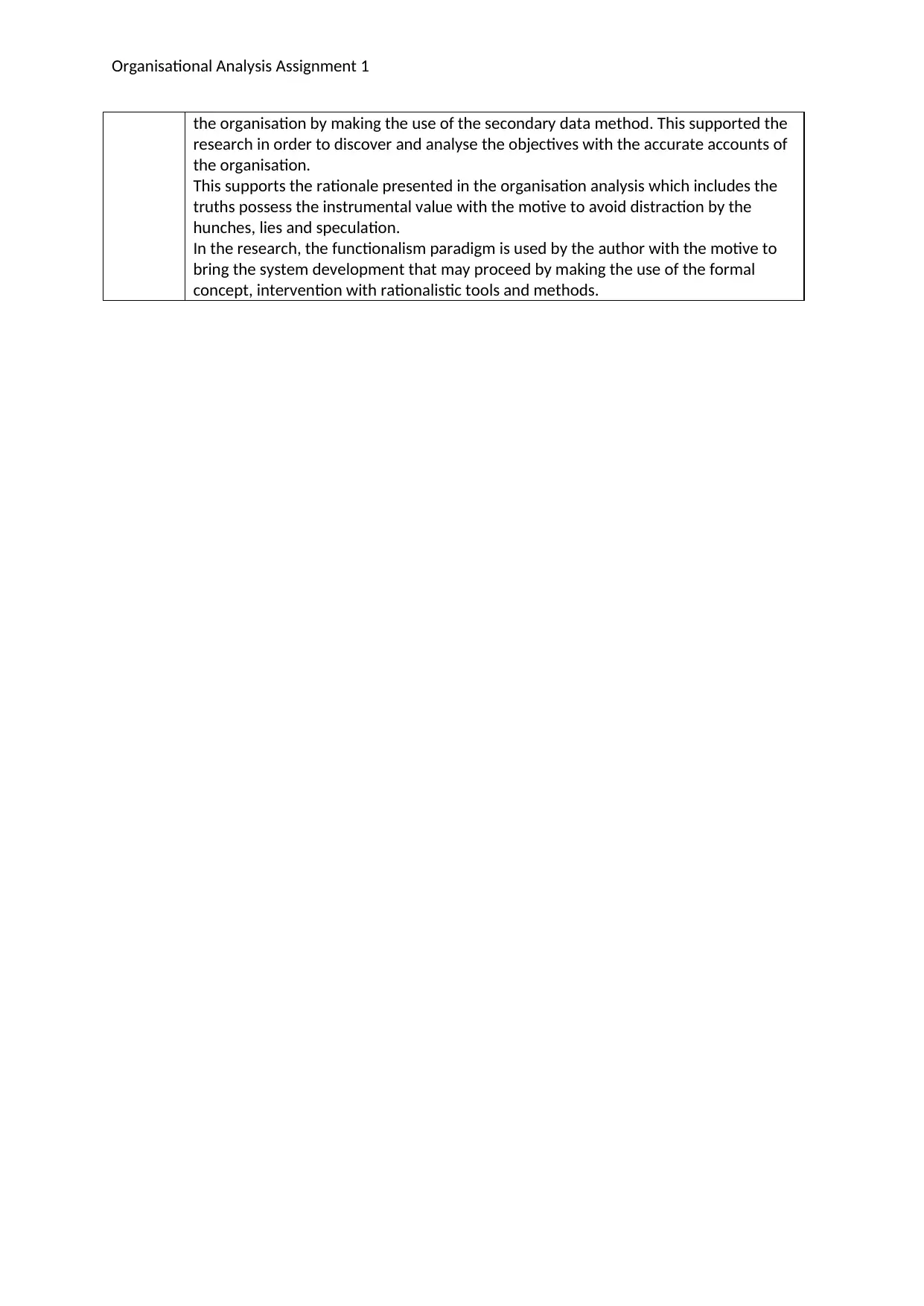
Organisational Analysis Assignment 1
the organisation by making the use of the secondary data method. This supported the
research in order to discover and analyse the objectives with the accurate accounts of
the organisation.
This supports the rationale presented in the organisation analysis which includes the
truths possess the instrumental value with the motive to avoid distraction by the
hunches, lies and speculation.
In the research, the functionalism paradigm is used by the author with the motive to
bring the system development that may proceed by making the use of the formal
concept, intervention with rationalistic tools and methods.
the organisation by making the use of the secondary data method. This supported the
research in order to discover and analyse the objectives with the accurate accounts of
the organisation.
This supports the rationale presented in the organisation analysis which includes the
truths possess the instrumental value with the motive to avoid distraction by the
hunches, lies and speculation.
In the research, the functionalism paradigm is used by the author with the motive to
bring the system development that may proceed by making the use of the formal
concept, intervention with rationalistic tools and methods.
⊘ This is a preview!⊘
Do you want full access?
Subscribe today to unlock all pages.

Trusted by 1+ million students worldwide
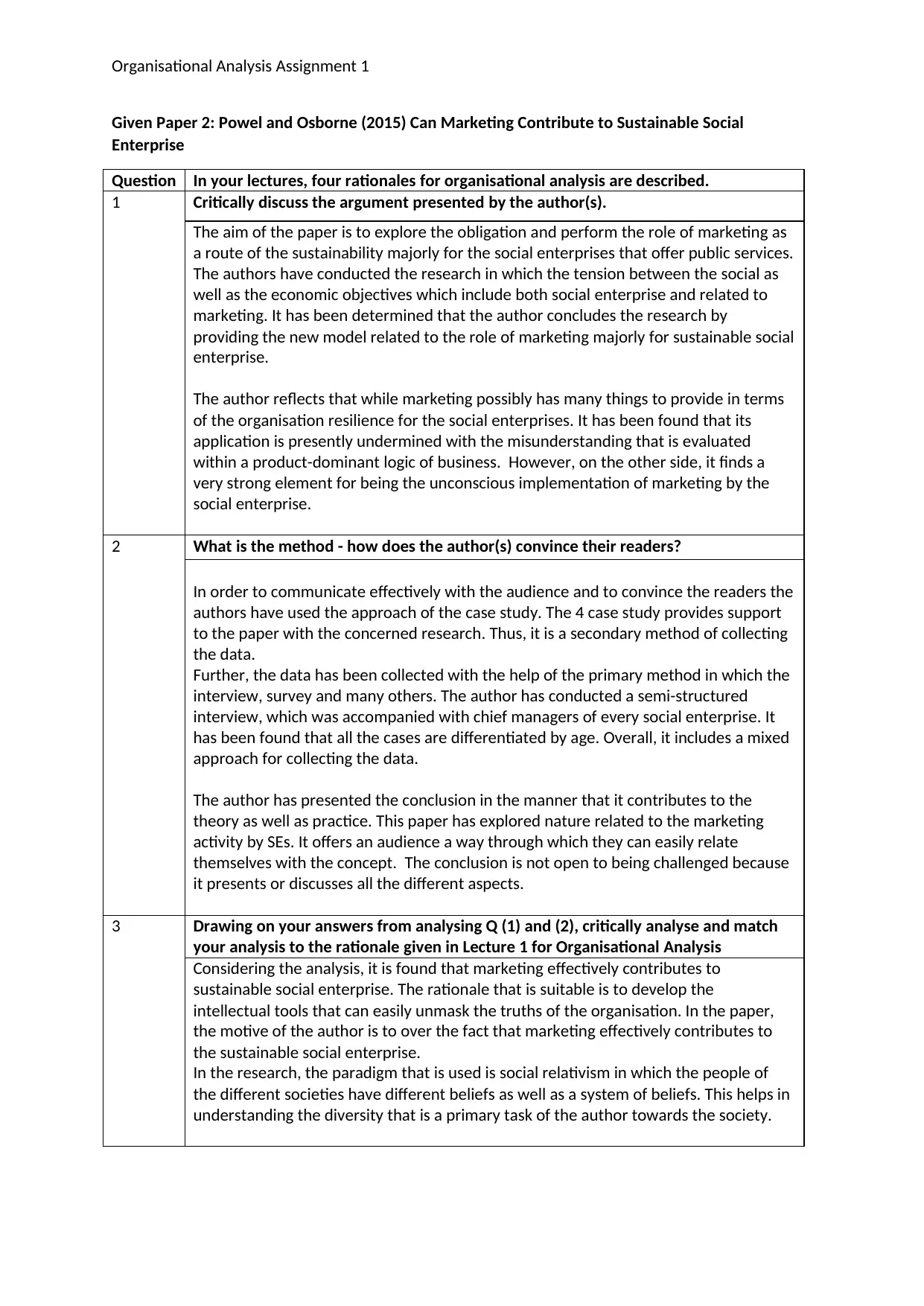
Organisational Analysis Assignment 1
Given Paper 2: Powel and Osborne (2015) Can Marketing Contribute to Sustainable Social
Enterprise
Question In your lectures, four rationales for organisational analysis are described.
1 Critically discuss the argument presented by the author(s).
The aim of the paper is to explore the obligation and perform the role of marketing as
a route of the sustainability majorly for the social enterprises that offer public services.
The authors have conducted the research in which the tension between the social as
well as the economic objectives which include both social enterprise and related to
marketing. It has been determined that the author concludes the research by
providing the new model related to the role of marketing majorly for sustainable social
enterprise.
The author reflects that while marketing possibly has many things to provide in terms
of the organisation resilience for the social enterprises. It has been found that its
application is presently undermined with the misunderstanding that is evaluated
within a product-dominant logic of business. However, on the other side, it finds a
very strong element for being the unconscious implementation of marketing by the
social enterprise.
2 What is the method - how does the author(s) convince their readers?
In order to communicate effectively with the audience and to convince the readers the
authors have used the approach of the case study. The 4 case study provides support
to the paper with the concerned research. Thus, it is a secondary method of collecting
the data.
Further, the data has been collected with the help of the primary method in which the
interview, survey and many others. The author has conducted a semi-structured
interview, which was accompanied with chief managers of every social enterprise. It
has been found that all the cases are differentiated by age. Overall, it includes a mixed
approach for collecting the data.
The author has presented the conclusion in the manner that it contributes to the
theory as well as practice. This paper has explored nature related to the marketing
activity by SEs. It offers an audience a way through which they can easily relate
themselves with the concept. The conclusion is not open to being challenged because
it presents or discusses all the different aspects.
3 Drawing on your answers from analysing Q (1) and (2), critically analyse and match
your analysis to the rationale given in Lecture 1 for Organisational Analysis
Considering the analysis, it is found that marketing effectively contributes to
sustainable social enterprise. The rationale that is suitable is to develop the
intellectual tools that can easily unmask the truths of the organisation. In the paper,
the motive of the author is to over the fact that marketing effectively contributes to
the sustainable social enterprise.
In the research, the paradigm that is used is social relativism in which the people of
the different societies have different beliefs as well as a system of beliefs. This helps in
understanding the diversity that is a primary task of the author towards the society.
Given Paper 2: Powel and Osborne (2015) Can Marketing Contribute to Sustainable Social
Enterprise
Question In your lectures, four rationales for organisational analysis are described.
1 Critically discuss the argument presented by the author(s).
The aim of the paper is to explore the obligation and perform the role of marketing as
a route of the sustainability majorly for the social enterprises that offer public services.
The authors have conducted the research in which the tension between the social as
well as the economic objectives which include both social enterprise and related to
marketing. It has been determined that the author concludes the research by
providing the new model related to the role of marketing majorly for sustainable social
enterprise.
The author reflects that while marketing possibly has many things to provide in terms
of the organisation resilience for the social enterprises. It has been found that its
application is presently undermined with the misunderstanding that is evaluated
within a product-dominant logic of business. However, on the other side, it finds a
very strong element for being the unconscious implementation of marketing by the
social enterprise.
2 What is the method - how does the author(s) convince their readers?
In order to communicate effectively with the audience and to convince the readers the
authors have used the approach of the case study. The 4 case study provides support
to the paper with the concerned research. Thus, it is a secondary method of collecting
the data.
Further, the data has been collected with the help of the primary method in which the
interview, survey and many others. The author has conducted a semi-structured
interview, which was accompanied with chief managers of every social enterprise. It
has been found that all the cases are differentiated by age. Overall, it includes a mixed
approach for collecting the data.
The author has presented the conclusion in the manner that it contributes to the
theory as well as practice. This paper has explored nature related to the marketing
activity by SEs. It offers an audience a way through which they can easily relate
themselves with the concept. The conclusion is not open to being challenged because
it presents or discusses all the different aspects.
3 Drawing on your answers from analysing Q (1) and (2), critically analyse and match
your analysis to the rationale given in Lecture 1 for Organisational Analysis
Considering the analysis, it is found that marketing effectively contributes to
sustainable social enterprise. The rationale that is suitable is to develop the
intellectual tools that can easily unmask the truths of the organisation. In the paper,
the motive of the author is to over the fact that marketing effectively contributes to
the sustainable social enterprise.
In the research, the paradigm that is used is social relativism in which the people of
the different societies have different beliefs as well as a system of beliefs. This helps in
understanding the diversity that is a primary task of the author towards the society.
Paraphrase This Document
Need a fresh take? Get an instant paraphrase of this document with our AI Paraphraser
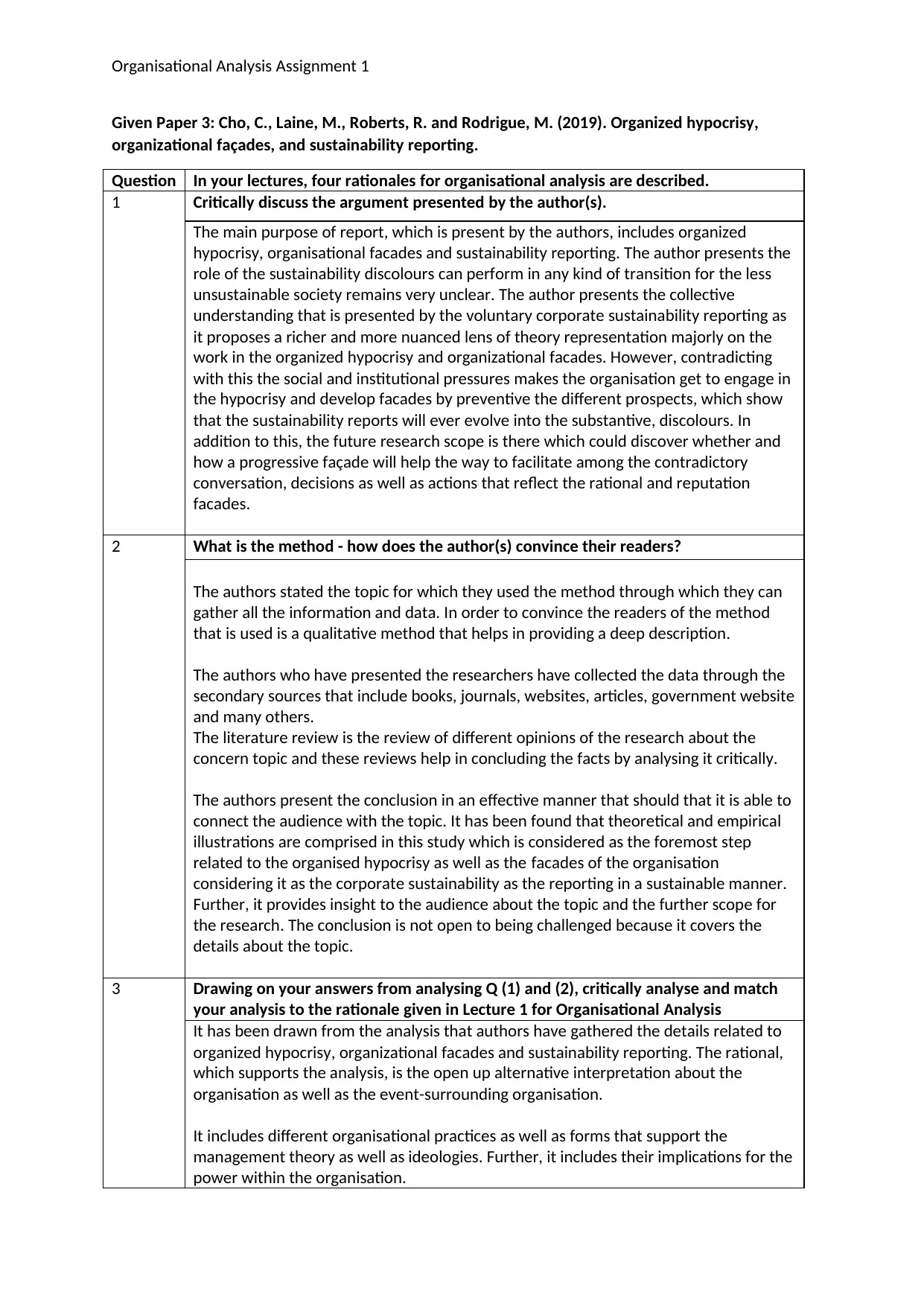
Organisational Analysis Assignment 1
Given Paper 3: Cho, C., Laine, M., Roberts, R. and Rodrigue, M. (2019). Organized hypocrisy,
organizational façades, and sustainability reporting.
Question In your lectures, four rationales for organisational analysis are described.
1 Critically discuss the argument presented by the author(s).
The main purpose of report, which is present by the authors, includes organized
hypocrisy, organisational facades and sustainability reporting. The author presents the
role of the sustainability discolours can perform in any kind of transition for the less
unsustainable society remains very unclear. The author presents the collective
understanding that is presented by the voluntary corporate sustainability reporting as
it proposes a richer and more nuanced lens of theory representation majorly on the
work in the organized hypocrisy and organizational facades. However, contradicting
with this the social and institutional pressures makes the organisation get to engage in
the hypocrisy and develop facades by preventive the different prospects, which show
that the sustainability reports will ever evolve into the substantive, discolours. In
addition to this, the future research scope is there which could discover whether and
how a progressive façade will help the way to facilitate among the contradictory
conversation, decisions as well as actions that reflect the rational and reputation
facades.
2 What is the method - how does the author(s) convince their readers?
The authors stated the topic for which they used the method through which they can
gather all the information and data. In order to convince the readers of the method
that is used is a qualitative method that helps in providing a deep description.
The authors who have presented the researchers have collected the data through the
secondary sources that include books, journals, websites, articles, government website
and many others.
The literature review is the review of different opinions of the research about the
concern topic and these reviews help in concluding the facts by analysing it critically.
The authors present the conclusion in an effective manner that should that it is able to
connect the audience with the topic. It has been found that theoretical and empirical
illustrations are comprised in this study which is considered as the foremost step
related to the organised hypocrisy as well as the facades of the organisation
considering it as the corporate sustainability as the reporting in a sustainable manner.
Further, it provides insight to the audience about the topic and the further scope for
the research. The conclusion is not open to being challenged because it covers the
details about the topic.
3 Drawing on your answers from analysing Q (1) and (2), critically analyse and match
your analysis to the rationale given in Lecture 1 for Organisational Analysis
It has been drawn from the analysis that authors have gathered the details related to
organized hypocrisy, organizational facades and sustainability reporting. The rational,
which supports the analysis, is the open up alternative interpretation about the
organisation as well as the event-surrounding organisation.
It includes different organisational practices as well as forms that support the
management theory as well as ideologies. Further, it includes their implications for the
power within the organisation.
Given Paper 3: Cho, C., Laine, M., Roberts, R. and Rodrigue, M. (2019). Organized hypocrisy,
organizational façades, and sustainability reporting.
Question In your lectures, four rationales for organisational analysis are described.
1 Critically discuss the argument presented by the author(s).
The main purpose of report, which is present by the authors, includes organized
hypocrisy, organisational facades and sustainability reporting. The author presents the
role of the sustainability discolours can perform in any kind of transition for the less
unsustainable society remains very unclear. The author presents the collective
understanding that is presented by the voluntary corporate sustainability reporting as
it proposes a richer and more nuanced lens of theory representation majorly on the
work in the organized hypocrisy and organizational facades. However, contradicting
with this the social and institutional pressures makes the organisation get to engage in
the hypocrisy and develop facades by preventive the different prospects, which show
that the sustainability reports will ever evolve into the substantive, discolours. In
addition to this, the future research scope is there which could discover whether and
how a progressive façade will help the way to facilitate among the contradictory
conversation, decisions as well as actions that reflect the rational and reputation
facades.
2 What is the method - how does the author(s) convince their readers?
The authors stated the topic for which they used the method through which they can
gather all the information and data. In order to convince the readers of the method
that is used is a qualitative method that helps in providing a deep description.
The authors who have presented the researchers have collected the data through the
secondary sources that include books, journals, websites, articles, government website
and many others.
The literature review is the review of different opinions of the research about the
concern topic and these reviews help in concluding the facts by analysing it critically.
The authors present the conclusion in an effective manner that should that it is able to
connect the audience with the topic. It has been found that theoretical and empirical
illustrations are comprised in this study which is considered as the foremost step
related to the organised hypocrisy as well as the facades of the organisation
considering it as the corporate sustainability as the reporting in a sustainable manner.
Further, it provides insight to the audience about the topic and the further scope for
the research. The conclusion is not open to being challenged because it covers the
details about the topic.
3 Drawing on your answers from analysing Q (1) and (2), critically analyse and match
your analysis to the rationale given in Lecture 1 for Organisational Analysis
It has been drawn from the analysis that authors have gathered the details related to
organized hypocrisy, organizational facades and sustainability reporting. The rational,
which supports the analysis, is the open up alternative interpretation about the
organisation as well as the event-surrounding organisation.
It includes different organisational practices as well as forms that support the
management theory as well as ideologies. Further, it includes their implications for the
power within the organisation.

Organisational Analysis Assignment 1
In the research study, the authors have made use of the radical structuralism which
looks at the macro elements related to the society like social class or the race. The
structuralism majorly emphasis on the objective reality related to the organizational
facades and sustainability reporting in the societal structures.
In the research study, the authors have made use of the radical structuralism which
looks at the macro elements related to the society like social class or the race. The
structuralism majorly emphasis on the objective reality related to the organizational
facades and sustainability reporting in the societal structures.
⊘ This is a preview!⊘
Do you want full access?
Subscribe today to unlock all pages.

Trusted by 1+ million students worldwide
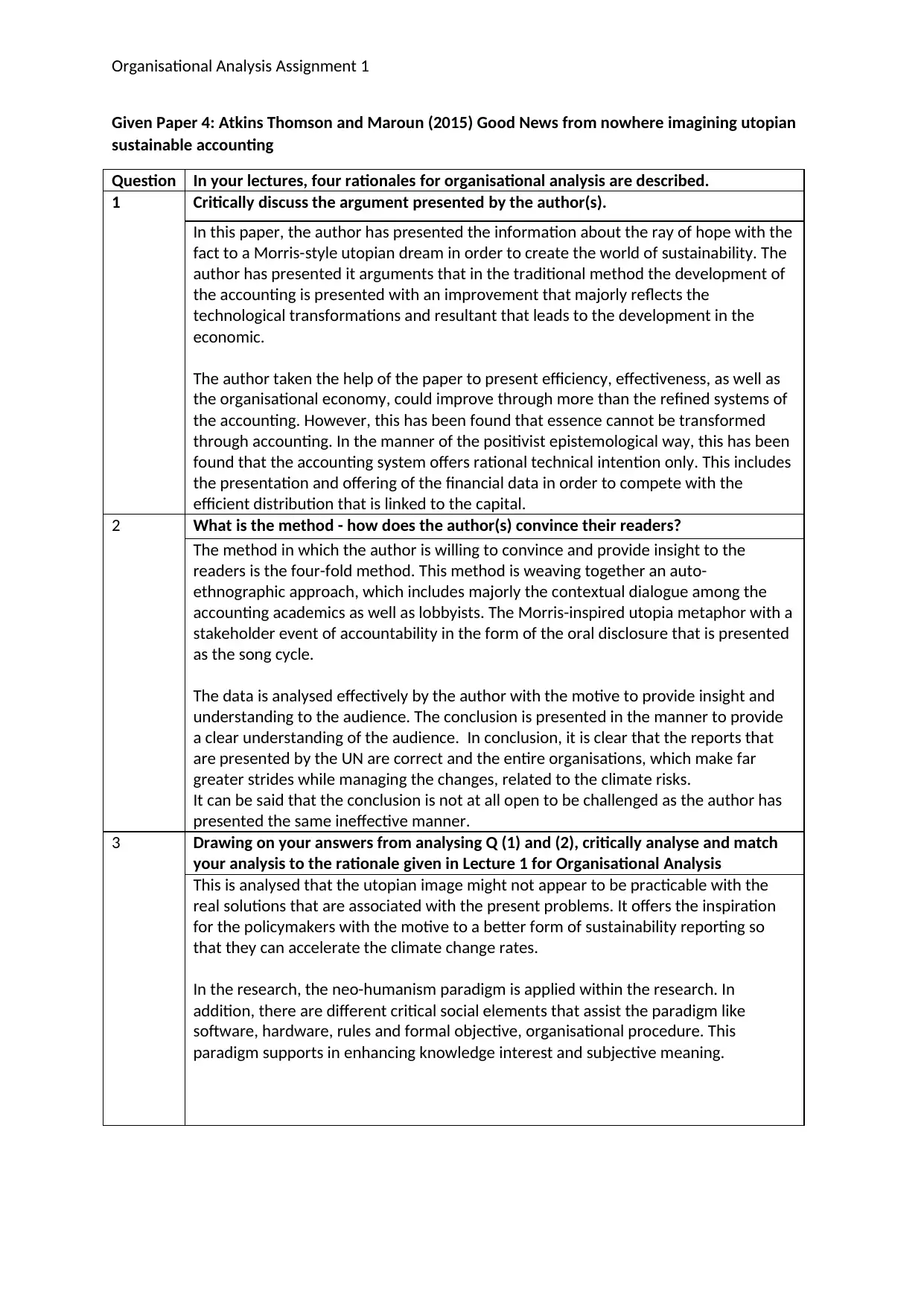
Organisational Analysis Assignment 1
Given Paper 4: Atkins Thomson and Maroun (2015) Good News from nowhere imagining utopian
sustainable accounting
Question In your lectures, four rationales for organisational analysis are described.
1 Critically discuss the argument presented by the author(s).
In this paper, the author has presented the information about the ray of hope with the
fact to a Morris-style utopian dream in order to create the world of sustainability. The
author has presented it arguments that in the traditional method the development of
the accounting is presented with an improvement that majorly reflects the
technological transformations and resultant that leads to the development in the
economic.
The author taken the help of the paper to present efficiency, effectiveness, as well as
the organisational economy, could improve through more than the refined systems of
the accounting. However, this has been found that essence cannot be transformed
through accounting. In the manner of the positivist epistemological way, this has been
found that the accounting system offers rational technical intention only. This includes
the presentation and offering of the financial data in order to compete with the
efficient distribution that is linked to the capital.
2 What is the method - how does the author(s) convince their readers?
The method in which the author is willing to convince and provide insight to the
readers is the four-fold method. This method is weaving together an auto-
ethnographic approach, which includes majorly the contextual dialogue among the
accounting academics as well as lobbyists. The Morris-inspired utopia metaphor with a
stakeholder event of accountability in the form of the oral disclosure that is presented
as the song cycle.
The data is analysed effectively by the author with the motive to provide insight and
understanding to the audience. The conclusion is presented in the manner to provide
a clear understanding of the audience. In conclusion, it is clear that the reports that
are presented by the UN are correct and the entire organisations, which make far
greater strides while managing the changes, related to the climate risks.
It can be said that the conclusion is not at all open to be challenged as the author has
presented the same ineffective manner.
3 Drawing on your answers from analysing Q (1) and (2), critically analyse and match
your analysis to the rationale given in Lecture 1 for Organisational Analysis
This is analysed that the utopian image might not appear to be practicable with the
real solutions that are associated with the present problems. It offers the inspiration
for the policymakers with the motive to a better form of sustainability reporting so
that they can accelerate the climate change rates.
In the research, the neo-humanism paradigm is applied within the research. In
addition, there are different critical social elements that assist the paradigm like
software, hardware, rules and formal objective, organisational procedure. This
paradigm supports in enhancing knowledge interest and subjective meaning.
Given Paper 4: Atkins Thomson and Maroun (2015) Good News from nowhere imagining utopian
sustainable accounting
Question In your lectures, four rationales for organisational analysis are described.
1 Critically discuss the argument presented by the author(s).
In this paper, the author has presented the information about the ray of hope with the
fact to a Morris-style utopian dream in order to create the world of sustainability. The
author has presented it arguments that in the traditional method the development of
the accounting is presented with an improvement that majorly reflects the
technological transformations and resultant that leads to the development in the
economic.
The author taken the help of the paper to present efficiency, effectiveness, as well as
the organisational economy, could improve through more than the refined systems of
the accounting. However, this has been found that essence cannot be transformed
through accounting. In the manner of the positivist epistemological way, this has been
found that the accounting system offers rational technical intention only. This includes
the presentation and offering of the financial data in order to compete with the
efficient distribution that is linked to the capital.
2 What is the method - how does the author(s) convince their readers?
The method in which the author is willing to convince and provide insight to the
readers is the four-fold method. This method is weaving together an auto-
ethnographic approach, which includes majorly the contextual dialogue among the
accounting academics as well as lobbyists. The Morris-inspired utopia metaphor with a
stakeholder event of accountability in the form of the oral disclosure that is presented
as the song cycle.
The data is analysed effectively by the author with the motive to provide insight and
understanding to the audience. The conclusion is presented in the manner to provide
a clear understanding of the audience. In conclusion, it is clear that the reports that
are presented by the UN are correct and the entire organisations, which make far
greater strides while managing the changes, related to the climate risks.
It can be said that the conclusion is not at all open to be challenged as the author has
presented the same ineffective manner.
3 Drawing on your answers from analysing Q (1) and (2), critically analyse and match
your analysis to the rationale given in Lecture 1 for Organisational Analysis
This is analysed that the utopian image might not appear to be practicable with the
real solutions that are associated with the present problems. It offers the inspiration
for the policymakers with the motive to a better form of sustainability reporting so
that they can accelerate the climate change rates.
In the research, the neo-humanism paradigm is applied within the research. In
addition, there are different critical social elements that assist the paradigm like
software, hardware, rules and formal objective, organisational procedure. This
paradigm supports in enhancing knowledge interest and subjective meaning.
1 out of 7
Related Documents
Your All-in-One AI-Powered Toolkit for Academic Success.
+13062052269
info@desklib.com
Available 24*7 on WhatsApp / Email
![[object Object]](/_next/static/media/star-bottom.7253800d.svg)
Unlock your academic potential
Copyright © 2020–2026 A2Z Services. All Rights Reserved. Developed and managed by ZUCOL.





